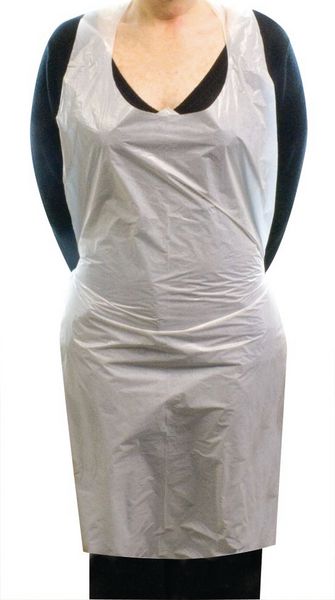Aprons
When in 1894, the German chemist Hans von Pechmann discovered diazomethane, a highly unstable gas, he couldn't have dreamt that a mere four years later he would accidentally synthesize from it what would become the most widely used plastic in the world: polyethylene. We'll mention a few of the uses in a moment, but one of the ingenious applications was the development of disposable personal protective aprons.
Workers specialising in food preparation and service, light-duty industrial wet areas, social care, nursing, medical and pharmaceutical sectors have been spared the risk of having their personal garments (and their health) damaged by decomposable, corrosive or staining substances and body fluids, thanks to disposable polyethylene aprons.
The polythene aprons we supply at SafetyShop.com are lightweight, waterproof, microbe-resistant and, just as importantly, low cost.
Let's move onto a more detailed exploration of what these products can offer employers and their staff.
Also discover:
Site safety equipmentBuy ppeChemical protective clothingDisposable latex glovesSafety helmetHi vis clothingPPE storageSafety footwearProtective gloves
Hans von Pechmann was investigating a substance he'd discovered four years earlier, a notoriously unstable gas galled diazomethane, when he accidentally created an entirely new substance from it: a white, waxy material that his colleagues, Eugen Bamberger and Friedrich Tschirner realised contained long chains of the methylene (CH2) molecule. They originally called it 'polymethylene' but, along the path of subsequent history, the 'm' was dropped.
It wasn't until 1938, however, that polythene began to be manufactured on an industrial basis (again, by accident: chemists Eric Fawcett and Reginald Gibson were applying exceptionally high pressure to a mixture of benzaldehyde and ethylene in their laboratory at ICI, when trace oxygen contaminated the apparatus and, again, a white waxy material was produced: polythene.
Today, it is the most common plastic in the world, with an annual global production of 50 million tonnes. Although it's used primarily in packaging (e.g., drink containers such as bottles, plastic films and plastic bags), it's also used in the manufacture of various pipes, hoses and other household articles, as well as the binding material for adhesives and paints, and as wax in polish.
We won't embark on a chemistry lesson here; however, because of its resistance to water and microbes, it is an excellent substance for making light duty personal protective aprons. Like our disposable polythene aprons, in fact.
Buying Guide
Our one-size-fits-all, waterproof, low-cost disposable polyurethane aprons are the ideal, low-cost personal protective equipment solution for all workers engaged in food preparation and service, nursing, pharmaceutical and medical applications or light-duty work in industrial wet areas.
Made from lightweight waterproof polythene plastic, SafetyShop.com sells them is dispenser packs containing 100 aprons.
FAQ
Are SafetyShop.com's disposable polythene aprons suitable for my social care staff in their care of elderly and disabled patients?
Yes. They'll protect uniforms from becoming soiled or contaminated with body fluids, reducing the number of microorganisms that get onto uniforms, especially from the knees to the waist areas, while administering care. They'll also reduce the danger of transfer of microorganisms to the carer's hands and to other patients that would otherwise occur through contact with the uniform.What activities are these aprons suitable for?
Any industry where personal garments or uniforms risk being contaminated by microorganisms, decomposable substances (such as meats and fish during food preparation), pharmaceuticals, industrial wet areas (light-duty) or by bodily fluids as in nursing and medical careTo order your packs of disposable polythene aprons from SafetyShop.com, simply add the items to your virtual basket on our website and proceed to the checkout.

